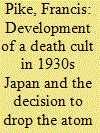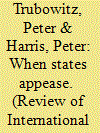|
|
|
Sort Order |
|
|
|
Items / Page
|
|
|
|
|
|
|
| Srl | Item |
| 1 |
ID:
145323


|
|
|
|
|
| Summary/Abstract |
Although post-2006 executive branch efforts to discourage unauthorized disclosures have been politically contentious, historical cases illustrate that the Espionage Act of 1917 has broad utility in prosecuting unauthorized information transfer, also known as “leaking.” Multiple United States federal courts, including the Supreme Court, have consistently upheld the Espionage Act and worked to clarify the statute through judicial interpretation. Late 1930s and early 1940s decisions, including the only Supreme Court hearing on the Espionage Act of 1917, re-affirmed the logic and legality of the Act. The 1941 Supreme Court decision, Gorin v. United States (1941), formed the primary legal precedent for the case of Rosen v. United States (2006), which began the recent U.S. government legal campaign to prosecute the unauthorized release of sensitive defense related information. Specifically, the 1930s cases established that the intent of the government employee, the “sensitivity” of the material transferred, or the status of the recipient were not mitigating factors.
|
|
|
|
|
|
|
|
|
|
|
|
|
|
|
|
| 2 |
ID:
144202


|
|
|
|
|
| Summary/Abstract |
In the 1930s Japan developed a death cult which had a profound effect on the conduct of the Japanese armed forces in the Pacific War, 1941–1945. As a result of government directed propaganda campaign after the overthrow of the Shogunate in 1868, the ruling military cliques restored an Imperial system of government which placed Emperor Meiji as the Godhead central to the constitution and spiritual life of the Japanese nation. A bastardised Bushido cult emerged. It combined with a Social-Darwinist belief in Japan's manifest destiny to dominate Asia. The result was a murderous brutality that became synonymous with Japanese treatment of prisoners of war and conquered civilians. Japan's death cult was equally driven by a belief in self-sacrifice characterised by suicidal Banzai charges and kamikaze attacks. The result was kill ratios of Japanese troops in the Pacific War that were unique in the history of warfare. Even Japanese civilians were expected to sacrifice their lives in equal measure in the defence of the homeland. It was for this reason that American war planners came to the shocking estimate that as many as 900,000 Allied troops could die in the conquest of mainland Japan – Operation DOWNFALL. Contrary to the view of numbers of revisionist historians in the post-war period, who have variously argued that the atom bombs were used to prevent Soviet entry into the war against Japan, Francis Pike, author of Hirohito's War, The Pacific War, 1941 – 1945 [Bloomsbury 2015] reaffirms that the nuclear weapon was used for one purpose alone – to bring the war to a speedy end and to save the lives of American troops.
|
|
|
|
|
|
|
|
|
|
|
|
|
|
|
|
| 3 |
ID:
164666


|
|
|
|
|
| Summary/Abstract |
This article scrutinizes the role of diplomats in foreign policy by focusing on the case of Sir Percy Loraine, British ambassador to Turkey (1934–1939). Accordingly, the article first introduces an agent-centered framework claiming that the ability of diplomats to make their mark on foreign policy is contingent upon how they fare in overcoming two types of dilemmas on diplomatic duty: the mandate dilemma and the allegiance dilemma. The article then discusses how Loraine overcame these dilemmas with a particular focus on his mediating role in the establishment of bilateral economic and political partnership. Overall, the article argues that diplomats can make a difference in the conduct of foreign policy by influencing not only the host government but their own government as well, provided that they find a balance between following orders and using own discretion and between their loyalty to the government they represent and responsibility to the receiving government.
|
|
|
|
|
|
|
|
|
|
|
|
|
|
|
|
| 4 |
ID:
146051


|
|
|
|
|
| Summary/Abstract |
International sport, as Geoffrey Pigman has correctly observed, emerged “as a quintessential case study demonstrating the part that public diplomacy plays in contemporary diplomacy.” The British Empire Games/Commonwealth Games [BEG/CG] are one such example, being the second largest multi-national multi-sport event today. Their origins lie in the interwar era when members of sporting organisations, many of whom were active in other formal aspects of public life, considered the organisation of specific Imperial events through international networking. Described as lacking a “thoroughly analytical and interpretive account of their history,” questions of identity politics, public diplomacy and statecraft are at their core because the BEG, inaugurated in 1930, represented qualities and values that appealed to governments, civil society, and sportspeople alike. In the waning of the British Empire, the BEG was one attempt to maintain Imperial prestige and cement cultural bonds. Yet, not only is there an absence of analytical accounts of their history, but the inter-relationships between the BEG and diplomacy, and among global sport and diplomacy more broadly, have been similarly under-investigated. This absence is striking, representing a missed opportunity in understanding the development of global sport and international relations more generally.
|
|
|
|
|
|
|
|
|
|
|
|
|
|
|
|
| 5 |
ID:
139579


|
|
|
|
|
| Summary/Abstract |
When do states appease their foes? In this article, we argue that governments are most likely to favour appeasing a foreign threat when their top leaders are severely cross–pressured: when the demands for increased security conflict sharply with their domestic political priorities. We develop the deductive argument through a detailed analysis of British appeasement in the 1930s. We show that Neville Chamberlain grappled with a classic dilemma of statecraft: how to reduce the risk of German expansionism while facing acute partisan and electoral incentives to invest resources at home. For Chamberlain, appeasement was a means to reconcile the demands for increased security with what he and his co-partisans were trying to achieve domestically. We conclude by discussing implications of the analysis for theorising about appeasement and about how leaders make grand strategy more generally.
|
|
|
|
|
|
|
|
|
|
|
|
|
|
|
|
|
|
|
|
|